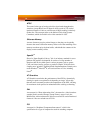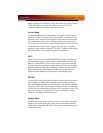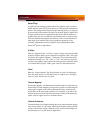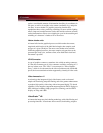
133
mainly in Europe for transferring analog audio and video signals between
VCRs, DVD players, personal computers, and set-top boxes. It is
sometimes referred to as Péritel or the Euroconnector.
Scissor Mode
A graphical load-balancing scheme where two graphics cards are used to
render two halves of an image display. One graphics card renders the top
half of the screen while the second graphics card renders the bottom half.
This configuration offers a form of dynamic load balancing between the
two cards as each only needs to render 3D object details on only half of the
screen instead of the full screen at any one time. This type of graphical
operation is only available in Radeon
®
CrossFire
™
graphics cards running
Microsoft
®
Direct 3D
®
and OpenGL
®
games or applications.
SDTV
SDTV is an acronym for “Standard Definition Television” that identifies
lower resolution systems when compared to High Definition Television
(HDTV) systems. SDTV systems use the same 4:3 aspect ratio and 480
scan lines to produce a picture as regular analog television sets, but digital
decoding enhanced of the signal, displaying a sharper and crisper picture.
SDTV broadcasts are either interlaced (480i) or use progressive scan
(480p), the latter method providing the best overall image quality.
SECAM
An analog color video signal that originated in France, and is used in many
other countries, including (but not limited to) much of Eastern Europe,
parts of the Middle East and Asia. Like the PAL video standard, SECAM
also draws a total of 625 vertical interlaced frames of video at a refresh rate
of 25Hz, but uses a fundamentally different way of encoding its colors. The
name is an acronym for “Séquential Couleur avec Mémoire,” which is
French for “sequential color with memory.”
Shadow Mask
In CRT monitors, the shadow mask is a metal plate full of tiny holes that is
attached to the inside of the glass screen. It focuses the beams from the
electron guns at the back of the CRT. The distance between these holes is
called the dot pitch.


















